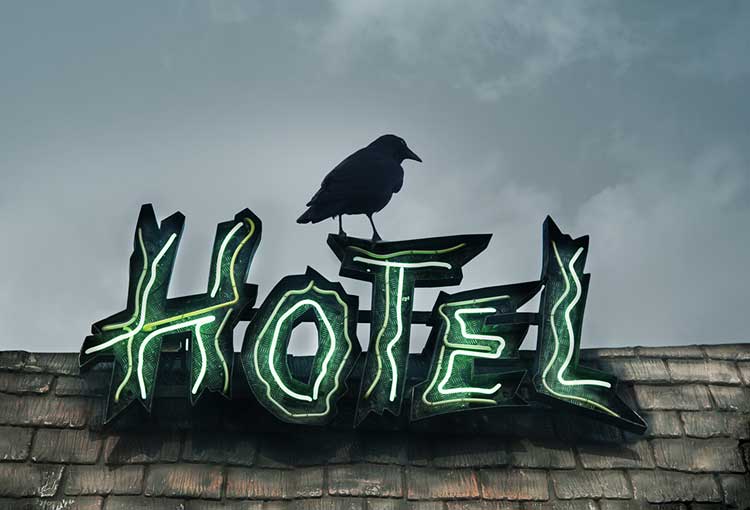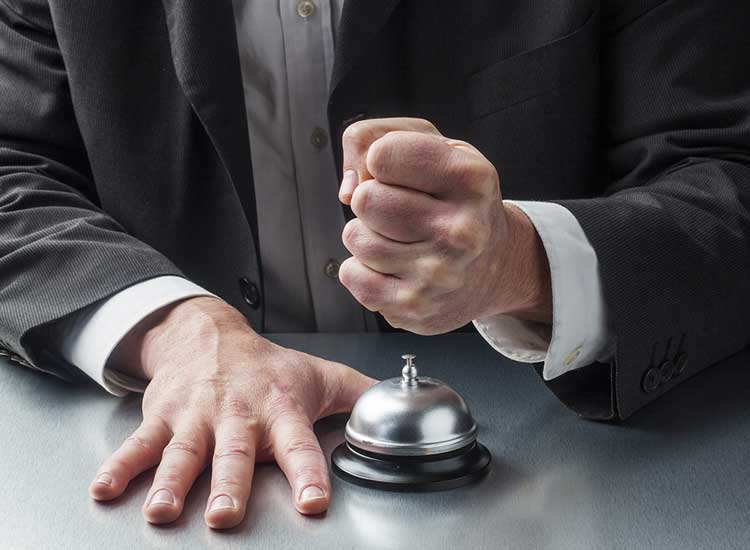Last updated May 2025

Hotel reservation sites showcase abundant guest ratings, 3D room tours, and tools letting you filter properties by features from location to pet friendliness. So why does it feel so nightmarish now to book a pleasant stay—and why have so many hotels seen a drop in guest satisfaction?
Click below to listen to our Consumerpedia podcast episode.
I’m often challenged to find hotels I like. Hotel reservation sites such as Booking.com, Expedia.com, Hotels.com, and dozens more have hard-to-understand star-scoring systems and reviews that seem written by easily impressed rookies. Worse, many other reviews are fake, generated by the hotels using AI.
Hotel websites overflow with glamour shots making 300-square-foot guest rooms resemble mansions. And travel TikTokers and Instagrammers create pretty content—but get paid thousands of dollars plus comped stays in exchange for gushing about Casa de Whatever. “Influencers don’t want to show you the bad part of a hotel, it’s more of a ‘look where I am’ thing,” said Annie Fitzsimmons, a luxury travel expert and author of the book 100 Hotels of a Lifetime.
This lack of clarity and the mixed bag of online lodgings reviews mean that for every overnight success I experience—San Antonio’s plush Hotel Emma, in a converted 19th-century brewery—I’ve had a horrible hotel stay.
Recently, I bunked in a Maryland chain motel with a moldy bathroom and a moody elevator that worked erratically—a real annoyance for my 80-something in-laws.
For a girls’ weekend to see Frank Lloyd Wright’s Fallingwater in Pennsylvania in 2023, there weren’t many convenient places to stay. The B&B my friends and I booked in a historic, small-town mansion was well-reviewed online, but in real life starred dusty rooms, saggy mattresses, and endless displays of glassy-eyed, worn-out toys. We now remember it as “Creepy Doll Manor.”
The five-star Copenhagen hotel my husband and I splashed out on last summer? Mostly a bust, despite the property’s killer location in a converted 1912 post office—and recommendations from several travel websites. Sure, the sheets were crisp, the soap smelled nice, and the very small bathroom was filled with marble. But the closet-sized, reservations-only sauna and weensy guest room (my husband dubbed it the “Tom Thumb Suite”) felt stingy and unwelcoming.
So, in an era of confusing booking websites and too little honest information on hotels, is there a formula for getting a great room at a fair price? Here are my top tips:

Take Hotel Reviews with a Grain of Salt
When sifting through online reviews, compare those with five-star scores to those with one- and two-star ratings. (You might even read some middling reviews for comparison.)
Look for comments on amenities important to you, especially any deal breakers. If you’re a light sleeper, does anyone complain about noise from a highway or nightclub on the same block? If a swimming pool for your kids is vital, do reviewers say anything about its size, cleanliness, or whether it’s even open? Is there more than one mention of uncomfortable beds?
A red flag that you’ve found a Bates Motel franchise: A pattern of negative comments about the same thing (too noisy, hungry bed bugs, creepy staff). Positive signs include hotel management that responds constructively to critical comments and praise from returning customers. (“We stay at this property every year, and we love its colorful wallpaper and golf course.”)
“You have to dig into the reviews,” said Jeremy Wells, a strategist at hospitality branding and design firm Longitude°. “Some negative comments might be for something that doesn’t matter to you, like someone who gives a bad review to a hotel because you can’t bring your dog, but you don’t even have a pet.”
Read the Fine Print and Scrutinize Photos
Need java immediately upon waking or a swim just before bed? Carefully read the hotel’s website and scrutinize its photos before choosing the property and a specific room. Don’t assume a room has a hair dryer, coffee maker, or bathrobe unless that’s specified. Look at a photo of the room class you want to book, not an image of the Presidential Suite that’s $20,000 a night.
“Don’t take everything at face value,” says Tara Busch, a travel advisor and founder of the Conscious Travel Collective agency. “Photos can be so misleading—is that a settee or a chair? You can’t tell if it’s taken through a fisheye lens.”
No pics? Do not book. Even if there are photos, ignore those that don’t help you learn what the hotel actually looks like. Some shady hosts now display stock photos or shots of continental breakfast buffets instead of images of their rooms, lobbies, or gyms. Also, make sure previous guests have uploaded helpful pics, then compare them with those used by the hotel: Do they seem like they’re for the same place?
Look for a True Hotel Critic
Be wary of glowing, overly positive TikToks, Instagram reels, and booking site reviews. Many people—even journalists—are creating content because they’ve gotten a free stay, have a lucrative marketing deal, or just want to art direct their vacation into a White Lotus episode (sans cheating spouses and dead bodies). Even some reputable magazines and websites (Travel + Leisure, Condé Nast Traveler) primarily report on hotels that are brand new or have undergone major renovations.
A few sources still do honest, critical reviews, meaning experienced journalists stay overnight (anonymously) in hotels and then pass judgment. Look to The Telegraph, Rick Steves, Frommer’s, or the Michelin Guide for opinionated, pro takes on where to lay your head. (Michelin recently launched its one-to-three key hotel rating system in the U.S., Canada, and Mexico.) These outlets examine properties in all price ranges, a boon when some hotel rates are up as much as 79 percent since before the COVID-19 pandemic.
Map it Out Before Booking
For many travelers, location is everything. Booking sites generally allow you to filter properties by neighborhood; some indicate how far a hotel is from the city center. “But ask yourself what you want—do you want to splurge on a hotel that’s right downtown or stay in a neighborhood a bit further out?” said Busch.
Plot out possible properties before reserving a room. “I put the restaurants I want to eat at and places I want to go on Google Maps,” says Fitzsimmons. “Then I’ll add hotels to see what’s convenient.”
Want to stay near a subway stop or train station? Map out nearby options.
Check what else is near your hotel (Google Street View can be handy here) to avoid booking a room overlooking the Lincoln Tunnel exit in New York City, being above several noisy bars, or facing a creepy cemetery (unless that’s your thing, Wednesday Addams).

Can’t Find a Deal? Book with the Hotel
Our researchers looked for the best deals for 75 stays and found that most travel-booking sites and hotel websites offer identical prices. That’s because most third-party booking websites are owned by either Expedia, Inc. or Booking Holdings. Hotels and these two conglomerates have struck agreements that require the same prices be posted across all booking platforms.
It’s still worth shopping around. Sometimes you’ll uncover lower prices. One way to save is to create accounts with hotels and booking sites; doing so might “unlock” small discounts of five to 10 percent.
If you get the same rates from booking websites and hotels, book directly with the hotel. This might score you a better room, a free upgrade, or other perks. And if you have a problem, you won’t be dealing with a third party to get a cancellation or refund.
Don’t Be Trapped by Brand Loyalty
Hotel chains seek repeat clients with branding, a sense that you’ll get the same cushy pillows/hot chocolate chip cookies/warm welcome in Marriotts or Hiltons from Arizona to Zanzibar. But many “name brand” properties are franchises and differ wildly from place to place.
“The quality of chains isn’t consistent, except maybe at the high end, like the Four Seasons,” said Sarah Stodola, author of the travel Substack “Flung” and the book The Last Resort. “I recently had the worst experience at a well-known chain hotel in Fiji. Everything was dirty, falling apart, and seemed sketchy.”
And don’t obsess about earning points. Too many vacationers pass up great deals just because they don’t include staying with their preferred hotel-brand loyalty program. An easy formula to calculate the value of points is to assume that, depending on the program, you’ll earn $.01 to $.05 worth of points for every dollar spent. In other words, if you spend $1,000, you’ll get about $10 to $50 in points. Don’t give up $500 in savings by booking with a different hotel due to fretting over lost points.

Find Your Tribe
You might turn up a stay keyed to your taste via a special-interest hotel consortium. These are essentially paid membership organizations with specific requirements—and usually, fees—for the hotels that join them.
I’ve found cool vintage lodgings via the Historic Hotels of America, a division of the National Trust for Historic Preservation, where properties must be over 50 years old and meet certain standards. Last summer, I stayed at Santa Fe’s La Fonda on the Plaza where I dug sleeping beneath beamed ceilings and breakfasting in the restaurant filled with painted-glass panels.
Other hotel membership groups include Beyond Green, which holds properties to strict environmental and cultural standards, and Design Hotels, which includes 300-plus, high-style properties around the globe. The latter is how I turned up the Nobis Hotel Copenhagen, which I loved the first time I bunked in the Danish capital. It had a blend of historic details (ceiling moldings, a grand exterior) and mid-century interiors (sculptural light fixtures, low-slung lobby sofas).
Consider Using a Travel Agent or Advisor
A knowledgeable travel agent/advisor might find you a nicer room for a reasonable price, especially at high-end properties.
“I never would book a five-star hotel without going through an advisor,” Fitzsimmons said. “Even if you’re in the smallest room, you’ll probably get an upgrade thanks to their relationship with the hotel.” Since agents are paid a commission by hotels, you’ll usually shell out little or nothing for their services.
Click here for advice on working with a travel agency and follow the links below for other articles about saving money (and avoiding scams) when booking and taking trips.


